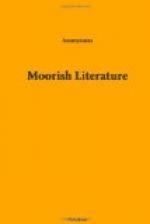They gave me three provinces and So’dah, this is the exact truth that I
am telling here.
Then came an old woman of evil augur and she threw dissension among us,
and the Helals left for a distant land.
Then Abou Ali said to me: ‘Dyab, you are but a fool,’
I marched against him under the wing of the night, and flames were
lighted in the sheepfolds.
He sent against me Hassan the Hilali, I went to meet him and said, ’Seize
this wretched dog.’ These are the words of the Zoght Dyab
ben Ghanem and the fire of illness was lighted in his
breast."[10]
[10] R. Basset. Un Episode d’une chanson de geste Arabe sur la seconde conquete de l’Afrique Septentrionale par les Mussulmans. Bulletin de Correspondence Africaine, p. 147. Alger, 1885, in 8vo. See also Stemme. Tripolitanisches Bederinenlieder. Leipzig, 1804, in 8vo.
The second style of modern Arabic poetry is the “Kelamel hazel.” It comprises the pieces which treat of wine, women, and pleasures; and, in general, on all subjects considered light and unworthy of a serious mind. One may find an example in the piece of “Said and Hyza,” and in different works of Mr. Stemme cited above. It is particularly among the nomad Arabs that this style is found, even more than the dwellers in cities, on whom rests the reproach of composing verses where the study and sometimes the singularity of expression cannot replace the inspiration, the energy, and even the delicacy of sentiment often found among the nomads:
“The country remains a desert, the
days of heat are ended, the trees of
our
land have borne the attack of Summer, that is my grief.
After it was so magnificent to behold,
its leaves are fallen, one by one,
before
my eyes.
But I do not covet the verdure of a cypress;
my sorrow has for its cause
a
woman, whose heart has captivated mine.
I will describe her clearly; you will
know who she is; since she has gone
my
heart fails me.
Cheika of the eye constantly veiled, daughter
of Mouloud, thy love has
exhausted
me.
I have reached a point where I walk dizzily
like one who has drunken and
is
drunk; still am I fasting; my heart has abandoned me.
Thy thick hair is like the ostrich’s
plumes, the male ostrich, feeding in
the
depressions of the dunes; thy eyebrows are like two
nouns
[Arab letters] of a Tlemcen writing.
Thy eyes, my beautiful, are like two gleaming
gun barrels, made at
Stamboul,
city defiant of Christians.
The cheek of Cherikha is like the rose
and the poppy when they open under
the
showers.
Thy mouth insults the emerald and the
diamond; thy saliva is a remedy
against
the malady; without doubt it is that which has
cured
me[1].”




